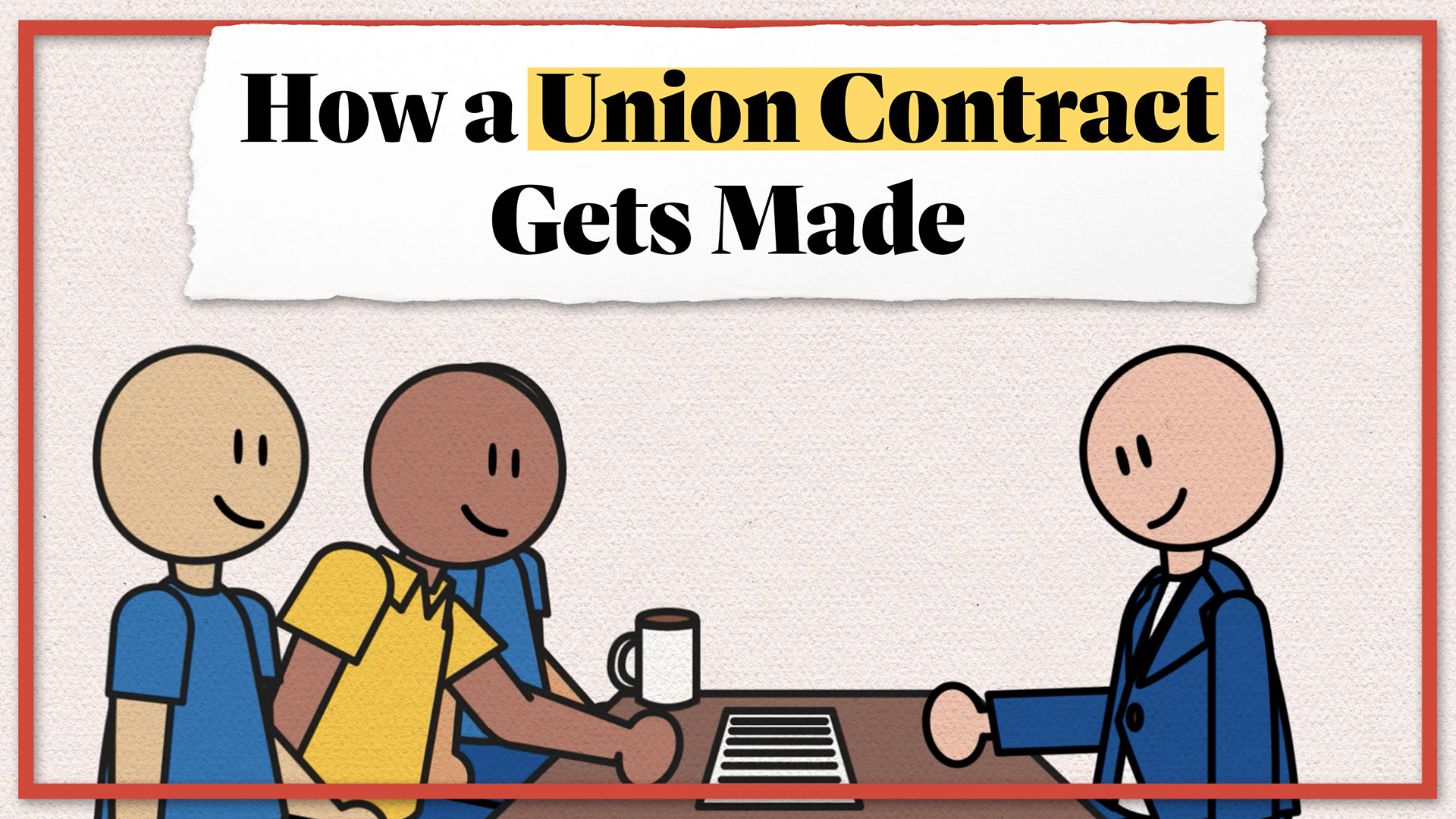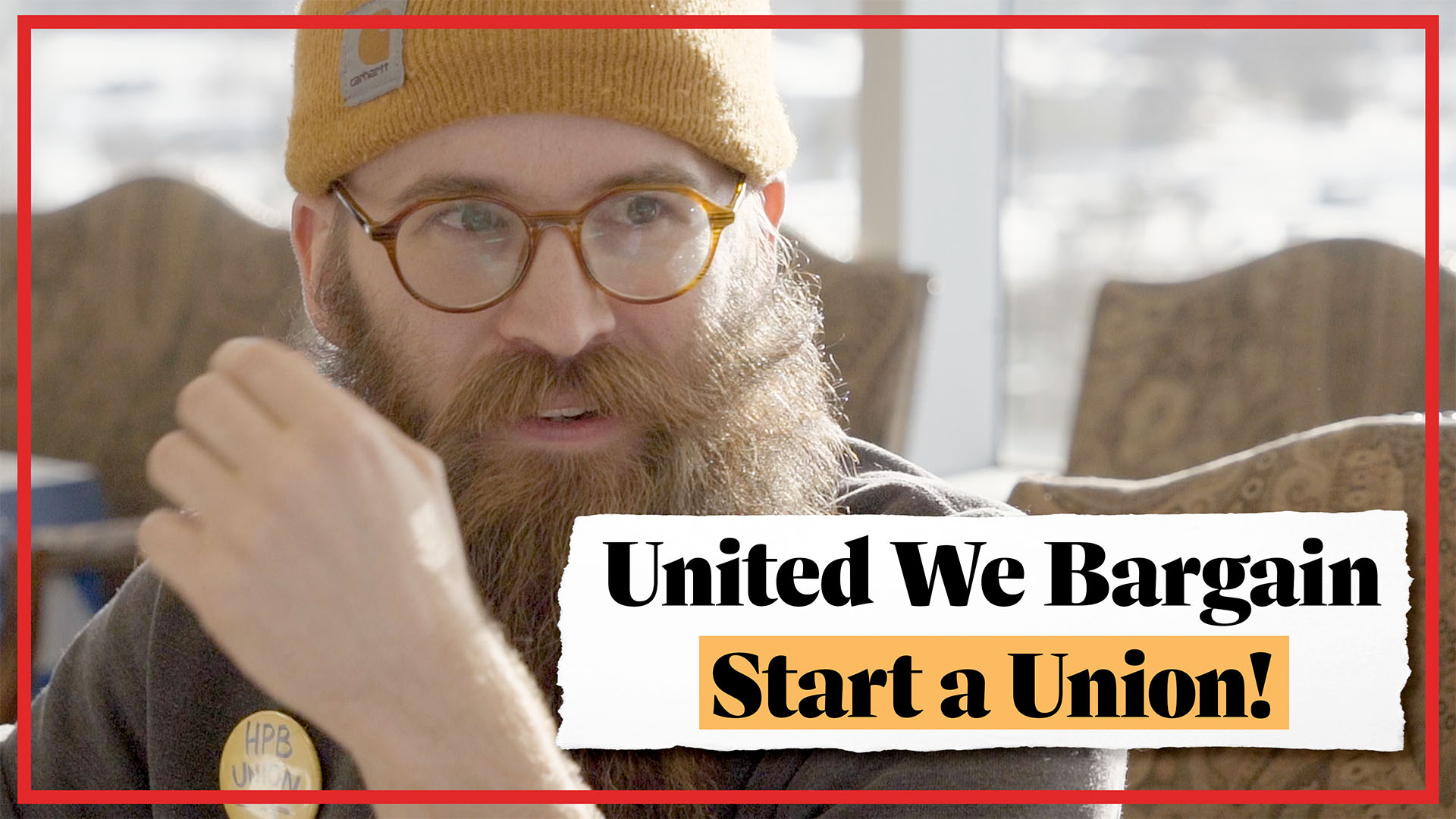After voting to unionize, you and your coworkers will come together and negotiate your first union contract with your employer. This contract, also known as a collective bargaining agreement, is the sum of all the things that you will agree to over the course of this negotiations process.
This process is the core of what makes us so strong as a union: together, our union siblings have been able to win the working conditions, pay, and benefits we need, not only to do our jobs safely and securely, but to live our lives well.
UFCW is your partner in fighting for the strongest contract you can get: we’ll supply you with bargaining experts who will sit next to you at the bargaining table and help all of you secure the kind of language that your coworkers will be proud to have in your union contract.
How a Union Contract Gets Made
These contracts are powerful because you negotiate them with a shared voice, with all of your coworkers. Plus, we can hold our employers accountable whenever they don’t follow your union contract in a way that we can’t with company policy and procedures.
You and each one of your coworkers get to vote on your contract before it can be ratified, so you have a voice at each stage of the unionizing process.
Frequently Asked Questions
What is a Union Contract? What is a Collective Bargaining Agreement?
After you vote to start a union, you and your coworkers will work with your employers to decide the new terms of your job. We take all of the working conditions we want to improve and put all of them into a complete document that becomes your union contract, or collective bargaining agreement. You have a say in everything that goes into it. It can include language and policy about anything related to your working conditions that you think is important.
These union contracts are the core of what makes our union so strong: all of the benefits we enjoy as union workers, we won as parts of the union contract we all negotiated with our employers.
How do I get a Union Contract?
Once you’ve unionized your workplace, you and all your coworkers become a part of a bargaining unit. Everyone in this unit gets to decide what they want to change and improve about the conditions of your work. All of your desired changes go into a series of proposals that you bring to your employer.
At the same time, all of you will elect a bargaining committee, a team that works with your union reps to negotiate the official contract with your company. They don’t have to accept all of the terms you offer from these proposals, but they do have to bargain in good faith with your committee. Your employer may try and drag this process out, but that’s why you focus on building the strongest union you can: so you and your coworkers have the power to get a great contract.
Every time your committee is satisfied with a proposal that they worked out with your employer, that proposal becomes a tentative agreement. This process will continue until your bargaining committee reaches tentative agreements on all the aspects of your contract that are important to you. Then all of you and your coworkers will come together to vote on whether you’re satisfied with your new contract or not.
This ratification vote is the final step before your union contract becomes the new law of the land. You all get the last word on whether the contract meets your needs. Anything you and your coworkers don’t support, you can bring back to the company until you’ve reached an agreement.
After a majority of you and your coworkers vote yes on the contract, it becomes your official, legally binding collective bargaining agreement. The more input you and your coworkers put into this process, the stronger your final contract will be. I It pays to work together!
What does “Bad Faith” Bargaining mean?
The NLRB defines bargaining in bad faith as a variety of tactics that make the bargaining process harder for you and your union, and often make your contract worse overall. That includes anything from refusing to bargain at reasonable times and intervals to making changes to your working conditions without bargaining with you over them first. That’s because when you have a union, you have a say at work!
When employers bargain in bad faith, they are making a big mistake: if they don’t uphold their end of the deal here, they’re breaking the law of the NLRA. This is one form of unfair labor practices we as workers have the power to push back on thanks to this law.
Learn More About How We Convert People Power to Strong Union Contracts
What happens if we don’t reach an agreement with our employer?
We resolve the vast majority of bargaining agreements that we set up with the employers we’ve unionized. Some employers are stubborn, but this is why you built a strong union: together, you can ensure your employer does the right thing by holding them accountable to the public.
There’s a wide range of ways you can do this, from speaking out on social media, to getting press coverage, picketing, or striking. Having a union lets you decide what tools you use to get a great contract.
How long do union contracts last?
Generally, union contracts last anywhere from two to five years — around when the contract ends, you and your employer come together to bargain over updates and changes to your existing contract through the same bargaining process we do when we make a first contract.
What is a strike?
A labor strike is a form of work stoppage where you and your coworkers withhold your labor for either a specific amount of time or indefinitely. It is the strategic act of refusing to work as leverage against your employer and is considered protected activity under the NLRA.
Workers go on strike typically for two major reasons: in response to employers who refuse to meet the demands of your union during the bargaining process, and after filing unfair labor practice charges against employers who have violated federal labor law.
You’ve likely seen the recent success of labor strikes across the United States, which have been a powerful reminder that strikes can be the ultimate escalation in a contract bargaining fight.
Unionize Your Workplace
Are you and your coworkers ready to negotiate for bigger raises, stronger benefits, and better lives? If so, the steps to start a union with UFCW are simple.



